'Eye-opening and enriching' - students reflect on a summer in China

Cultural trip to Qufu, Shandong Province
In July and August Imperial undergraduates joined hundreds of students from around the world for a 2 week learning and cultural experience in Beijing.
The programme, hosted by Tsinghua University, combined lectures, group activities, problem-solving and field trips – covering the areas of economics, environment, architecture, international relations and history. In addition, one stream of the programme focused on detailed environmental issues and solutions faced by China, including clean energy, air pollution, waste water management, urban sustainability.
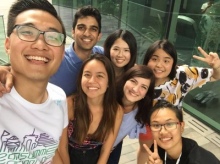 The 13 students who were successful in applying to the scheme – all in their first or second year of study at Imperial – received scholarships to cover all costs of the Summer School, including flights, student housing, food, visas, health insurance and local travel to Tsinghua.
The 13 students who were successful in applying to the scheme – all in their first or second year of study at Imperial – received scholarships to cover all costs of the Summer School, including flights, student housing, food, visas, health insurance and local travel to Tsinghua.
For most of the group it was their first time in China – and they approached the experience with a mixture of excitement and trepidation.
“Travelling to China was a dream come true for me. Since I can remember I’ve been fascinated with Asian culture and tradition. Coming to Tsinghua University was a great adventure,” said Marek Wolczynski (Biochemistry with German for Science).
The deep end
The nature of the trip was intentionally immersive and some students were initially overwhelmed by the size of Beijing and Tsinghua’s sprawling campus; the complexities of the transport network; and language barriers. But in nearly all cases this was actually confidence-building and led to strengthening of bonds with other international students, as Marta Nunes de Abreu (Biomedical Engineering) recalls.
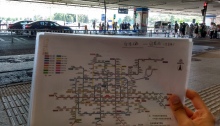 “I found the most challenging part having no previous travel experience alone and so having to navigate the journey has now given me a lot more confidence for the future,” said Genevieve Butt (Biological Sciences).
“I found the most challenging part having no previous travel experience alone and so having to navigate the journey has now given me a lot more confidence for the future,” said Genevieve Butt (Biological Sciences).
With many student coming from physical sciences and engineering backgrounds, there was a period of adjustment to unfamiliar concepts, often in the lectures about China’s very complex and multi-faceted environmental challenges. But the students enjoyed drawing on and adapting existing skills to a different set of problems.
“Because I was starting from pretty much ground zero, my learning curve was an exponential one. I was exposed to problems and theories previously unheard of – the idea of solving and modelling environmental problems with economics frameworks was completely new to me,” said Yan Tong Goh (Mathematics).
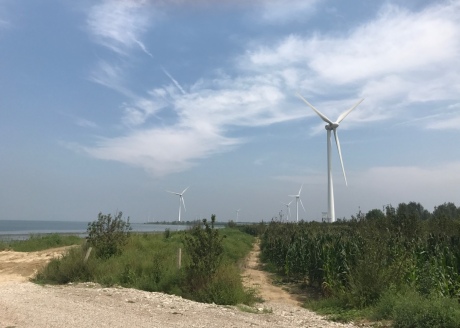
There were field trips, including to Beijing Lumingshan Guanting Wind Farm...
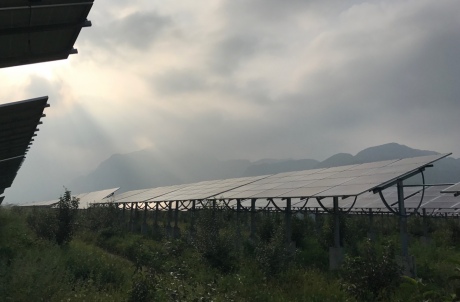
...and a solar power facility
Innovation challenge
Once of the most rewarding activities in terms of academic and professional development was the summer school group project, around the theme of big data. This involved the teams developing a comprehensive strategy to address certain aspects of Beijing’s pollution crisis. Ideas developed by Imperial students included integrating PM0.1 air quality sensors into Beijing’s public bike sharing network, in order to get real-time maps of air pollution across dispersed areas. Another idea was for a smartphone app to facilitate domestic carbon trading among householders. In fact Imperial students were among the teams that came first, second and third in the competition.
This innovation experience was consolidated by a visit some made to Tsinghua University’s X-Lab, a successful incubator launched in 2013 for students to pursue their own projects.
Ayush Dharap (Physics) said of the group project: “This experience allowed me to manage a group, allocate tasks based on people’s previous experience and skills, deal with disagreements on the project direction in a professional fashion.
“Collaboration is the foundation from which we can tackle most of our issues, and getting to spend two weeks with likeminded, yet diverse individuals, all equally driven to contribute to the field of environments is an experience I highly valued.”
Transformative experience
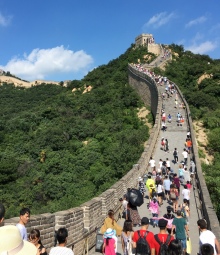 The summer school was rounded off by sight-seeing tours to the Great Wall of China at Badaling and Qufu, the hometown of one of China’s most iconic thinkers and philosophers Confucius.
The summer school was rounded off by sight-seeing tours to the Great Wall of China at Badaling and Qufu, the hometown of one of China’s most iconic thinkers and philosophers Confucius.
“Back when I applied for the summer programme, I knew it would be an incredible opportunity, but I could not have known just how eye-opening it would be,” said Yan Tong Goh.
Marta Nunes de Abreu (Biomedical Engineering) went further: “All in all, I believe I am now a more international person, in the sense that I have a better idea about the role that I play in this globalized world, and where I want to go from there.
Article text (excluding photos or graphics) © Imperial College London.
Photos and graphics subject to third party copyright used with permission or © Imperial College London.
Reporter
Andrew Czyzewski
Communications Division